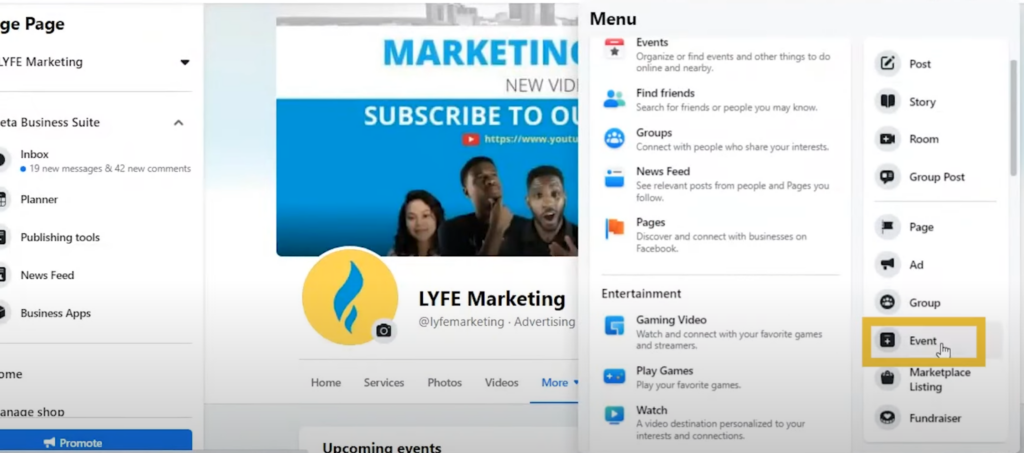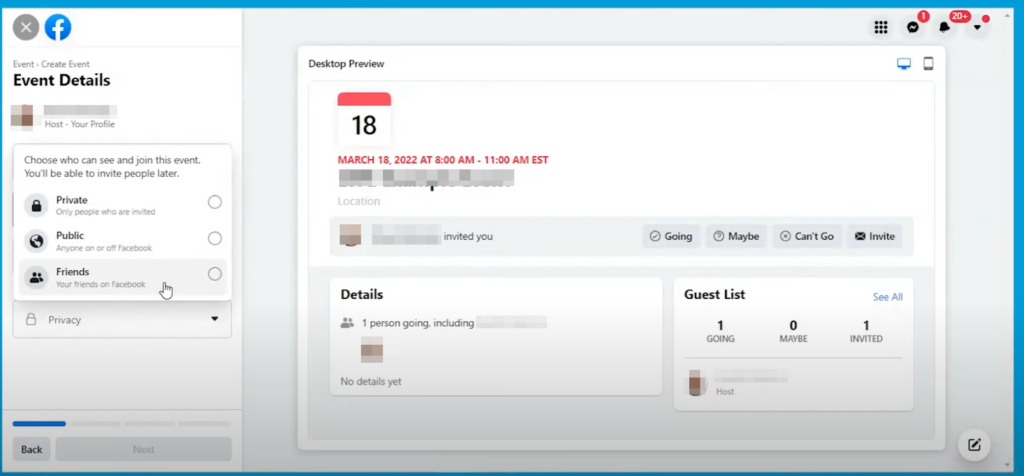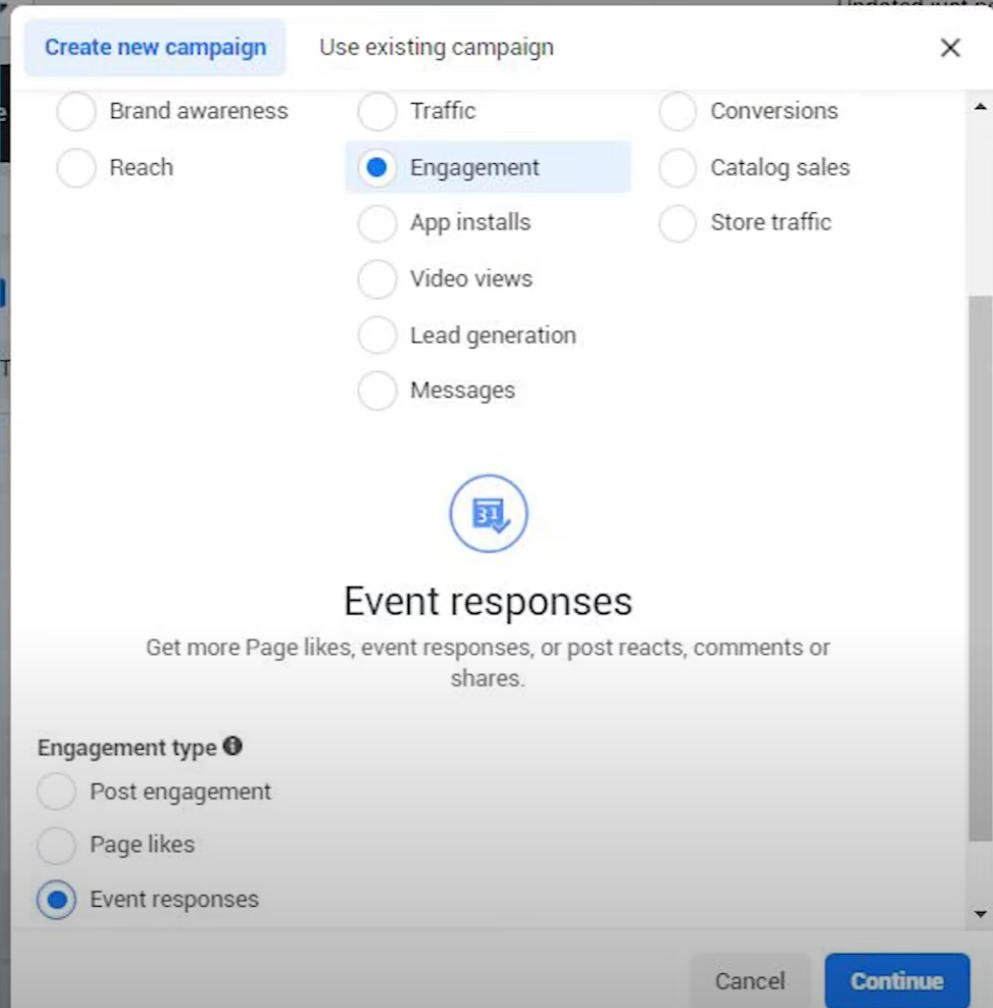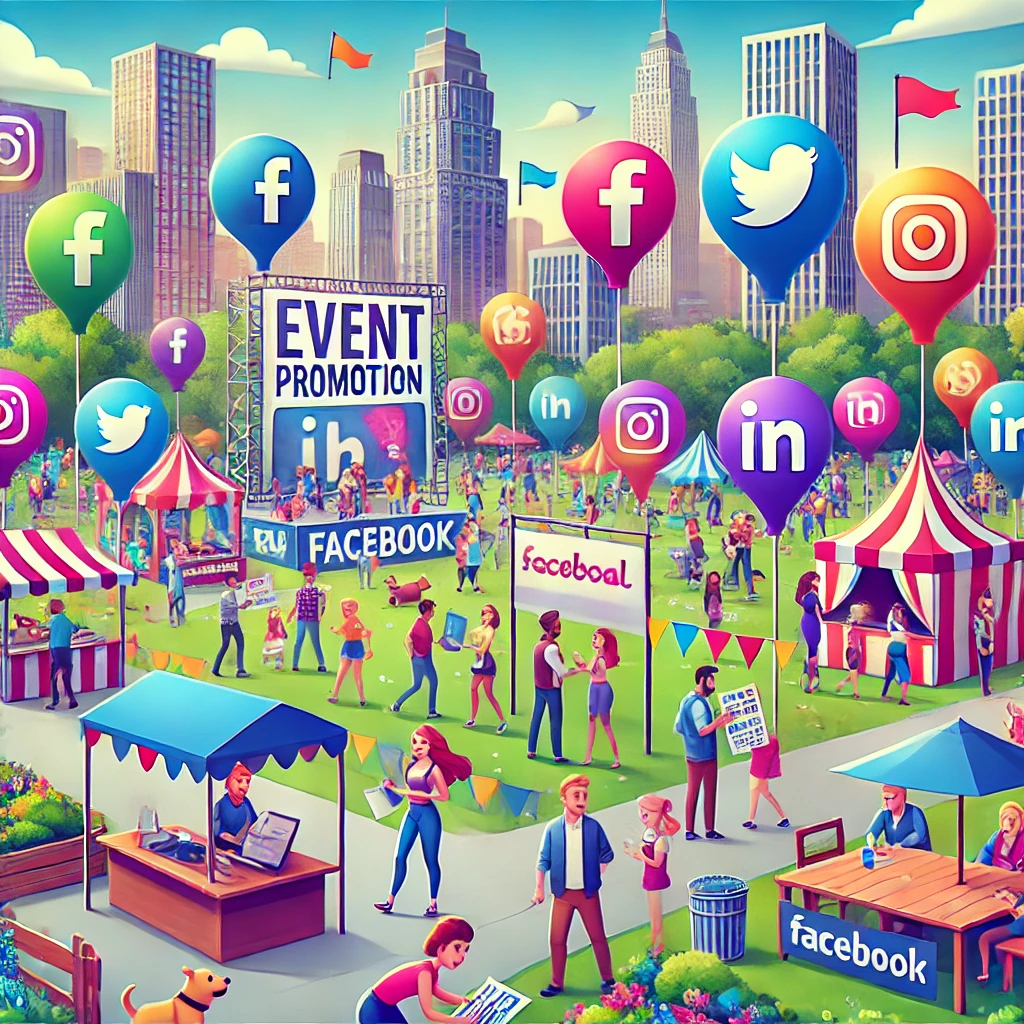Imagine you are planning a big event with guest speakers. You have the location, fun activities, and food all set up. Now, you only need an audience. Social media can help you with that.
Social media sites are not only for sharing cat videos and vacation pictures. They are also a powerful tool to promote virtual events. With the right plan, you can get people excited about your event. You can reach potential attendees and help make your event very successful.
In this article, we will discuss social media event promotion. We will share the best practices to follow and mention mistakes to avoid. You will also see how to make the most of each platform. So get ready to improve your event promotion!

Understanding Social Media Event Promotion
Let’s explore what social media event promotion is. It’s also important to know why this is crucial for organizing successful events.
What is Social Media Event Promotion?
Social media event promotion is a clever way to advertise events. You can use sites like Facebook, Instagram, Twitter, and LinkedIn to spread the word. A good promotion builds excitement and gets people eager to attend. When you market your event on social media, you need to create interesting posts. It’s also important to plan when to share them, reach the right audience, and chat with people who might come to the event.
Importance of Social Media for Event Promotion
Social media is very important for promoting events. Billions of people use many platforms. This means there are many different people to connect with. It helps organizers reach specific demographics easily. A key benefit is it allows quick and direct communication with potential attendees. Talking about the event can create excitement and interest. This can lead to more ticket sales and a bigger turnout.
Using social media for promotion has several benefits. You can get quick feedback and track your work easily. This feedback helps you change your strategies. It allows you to answer questions and improve your plans. Today’s analytics tools make it easy to see how well your promotions are working. This method also boosts the visibility of your event, reaching a wider audience than traditional marketing.

Pre-Event Social Media Strategies
In the time leading up to your event, it’s crucial to use social media to build excitement. Start by sharing a great story that will catch your audience’s eye. This will make them want to join in. Use platforms like Instagram and Facebook to give sneak peeks of your event. Show behind-the-scenes moments, and introduce key speakers or fun activities that guests can look forward to. Also, ask your followers to spread the word about the event details. This will help you reach a larger audience naturally.
Using targeted ads can help you get your messages to more people fast. You should think about creating a content calendar. This can help you share posts regularly. It keeps your event in the minds of potential attendees. By using these strategies, you can create a solid base for your event promotion efforts. This way, you can boost attendance and reach a larger audience.
Create a countdown
A countdown can really build excitement for your event. You can add the countdown sticker in your Instagram Stories to catch people’s eye. Make it special by customizing the sticker with your event name, date, and brand colors. When your followers see the countdown, they can opt to get reminders. This creates a sense of urgency and helps them remember to save the date. Use Instagram Stories to get the best results from this!
Countdowns do more than build excitement. They also help people remember key dates, like when tickets are available or when sign-ups finish. When you post countdown updates regularly, you create a sense of urgency. This keeps the chat alive and pushes people to share the countdown with friends. Because of this, more people will learn about your event.
Also, consider putting a countdown on your event landing page. This helps visitors see how much time is left before the event. A countdown creates a sense of urgency. It can attract more people to register, which can boost ticket sales. When used well, countdowns can raise interest and sell more tickets as the event date gets nearer.
Make your event landing page shareable
A landing page for your event is very important for reaching more people on social media. First, create a fun and useful landing page. This page should provide key information about your event. Include the event’s purpose, agenda, speakers, and how to register. Adding interesting text and attractive visuals can make it better for users. This will encourage visitors to share the page with their friends on social media channels.
Place social sharing buttons where everyone can see them on your landing page. This makes it easy for users to share the event details on their favorite social platforms, like Facebook, Twitter, and LinkedIn. When you do this, it will promote your event and build a sense of community. Attendees can share their excitement and invite more people to join them.
To get more sharing, consider giving small rewards or praise to those who sign up a specific number of people using their shared links. This plan can help your event stand out and get a larger audience. It can also boost attendance and interest. By making your event page easy to share, you can use social media to promote your event better.
Choosing the Right Social Media Platforms
Choosing the right social media platforms is important for a strong event promotion campaign. You need to check each platform and find out what makes it unique.
Comparing Social Media Platforms for Event Promotion
When you promote your event, pay attention to how different social media platforms stack up. Think about who you want to reach. Consider what kind of event you are hosting and where it will take place. Also, check how users interact on each platform.
- Facebook: Post your official events here to get more attention. Most users are between 18 and 44 years old. This helps you reach a large age group.
- Twitter: This platform is great for live updates and announcements. You can share when ticket sales start. Twitter’s hashtag feature can help more people learn about your event.
- Instagram: This platform targets younger users. It’s perfect for exciting event promotions. Use Stories and IGTV to share behind-the-scenes content or teasers for your event.
- LinkedIn: This platform is strong for promoting professional events. It works well for networking, making it ideal for conferences, seminars, and corporate training events.
Social Media Platforms: A Deep Dive
Looking at the main features of each platform can help you choose the best way for your campaign.
- Facebook’s Event Functions: This feature helps you make a special event page. You can add all the details there. You can send invites and see who has RSVP’d.
- Twitter’s Hashtag Usage: Using specific hashtags for your event can make it trend. Live tweeting keeps everyone updated and engaged.
- Instagram’s Visual Appeal: The “swipe up” feature in Instagram stories takes people directly to the event page. You can also go live and share short videos.
- LinkedIn’s Corporate Appeal: This site connects you to important people. It’s great for creating buzz about your professional event.
Align your plans with what each platform does best and what kind of event you have. Understanding this is important for good social media event promotion.
Creating a Social Media Event Promotion Strategy
Consistency, accuracy, and fresh ideas are key to a great plan for promoting events on social media. Let’s focus on knowing your target audience and making clear goals. Doing this will help you make your promotion better.

Identifying the Target Audience
The first step in your promotion strategy is to identify your target audience. You should learn about their social media habits and what they like. This understanding will help you create a strong foundation. For example, if most of your audience is professionals, LinkedIn is a good choice. But if your audience is younger and enjoys visuals, Instagram would be better. It matters to pick the right platform depending on where your target audience spends their time.
Setting Goals for Your Event Promotion
Knowing your “why” is important for your plan. Set clear and simple goals for your event promotion. These goals can be about raising your brand’s visibility, getting more people to create content, or just having more attendees at your event. For instance, if you want to improve brand visibility, track your “reach” and “impressions.” If your focus is on user-generated content, watch how people use your hashtags. These goals help you stay on track and show you how to measure your success.
Content Strategies for Social Media Event Promotion
To get the best results from social media for your event promotion, you should improve your content creation process. Use visuals and content made by users. This can help enhance your promotion and make it work better.
Using Visual Content for Event Promotion
Capture the interest of your audience by sharing exciting content about your event. A mix of images, videos, and infographics can really grab their attention. You can share short videos about the event or posters that highlight the main attractions. Showing photos from the event preparations can give viewers a sneak peek and make them feel curious. By focusing on visual elements, like pictures of the venue and guests, you build excitement. This helps create a strong connection between attendees and organizers, making everyone feel ready for the event.
Utilizing User-Generated Content for Event Promotion
Build your event plan on social media by using content from your guests. This will help create a sense of community and reach more people. You can have your online attendees invite others, share, and talk about your event on their pages. Instagram and Twitter are great for hashtag campaigns. Use this chance to promote special hashtags for your event. Ask your attendees to include these hashtags in their posts. For instance, encourage them to share how they are preparing or feel excited for the event using your custom hashtag. This personal connection will improve your event’s visibility and show how involved the guests are. Plus, the content made by attendees makes your event feel real. It builds trust through recommendations from peers.
Tools for Social Media Event Promotion
Social media event promotion requires several tools from beginning to end. Some of these tools can make the job simpler. They help with things like making content, timing posts, checking data, and engaging with the audience.
Social Media Event Promotion Tools
Social media event promotion needs different types of tools. You need tools for specific platforms, automation tools, and analytics tools.
- Platform-specific tools, such as Facebook Events and Instagram Stories, help you reach your audience where they are most active.
- Automation tools, like Hootsuite and Buffer, make tasks easier. They handle scheduling posts and sharing content across several platforms.
- Analytics tools, such as Google Analytics, give you helpful insights into how your promotion is performing. They help you see how your audience behaves. This information can guide you to create better strategies for your event promotion.
Evaluating the Efficiency of Automation Tools
To improve how you promote your events on social media, check how well automation tools work. Look at how easy they are to use and how flexible they are when scheduling. Make sure they work on different platforms and provide good reports. A good automation tool should be simple and fit various scheduling needs. It should also support many platforms and create detailed reports with actionable insights. For example, if Hootsuite gives clear performance data and helps you easily share content on different platforms, it is a great tool for your promotion. Remember, the goal is to boost efficiency, reach a wider audience, and enhance your event promotion on social media.
Case Studies of Successful Social Media Event Promotion
Check out some great examples of successful social media event promotion in this blog post. These examples are from various industries and events. They show how social media can be powerful and adaptable in getting people involved.
Oreo’s Super Bowl Blackout Response (2013)
Oreo did a great job of event marketing during the 34-minute blackout at the Super Bowl. They quickly tweeted, “Power out? No problem. You can still dunk in the dark.” This fast reaction used the moment well and showed Oreo’s creativity. Their tweet got over 15,000 retweets and received a lot of media attention. This showed how powerful real-time marketing can be.
1st Annual Singapore Tattoo Show (2009)
The 1st Annual Singapore Tattoo Show used social media to get the word out about the event. They set up a special Facebook group to help with this. They also used traditional marketing methods, like phone calls, emails, and SEO, to reach more people. The Facebook group created buzz and drew attention. In the end, 15,000 people came, which was much more than their goal of 5,000. This shows how social media can really help increase attendance at events.
2009 Senior PGA Championship
In 2009, a Senior PGA Championship took place in Cleveland, USA. A strong social media plan was in place for this event. The PR 20/20 team handled it. They created a blog and used Flickr and Twitter to share behind-the-scenes views of the event. Their teamwork helped promote content on various platforms. This led to more visitors and interaction. Twitter even became the second-largest source of traffic for the event’s blog. This shows how important good social media can be.
Airbnb’s User-Generated Content Campaign
Airbnb ran a successful campaign. They asked users to share their travel stories on social media with specific hashtags. The content made by users was displayed on Airbnb’s platforms. This connected well with potential customers. The campaign used real and relatable content from users. This approach helped Airbnb build a stronger bond with its audience and raise interaction levels.
Eastwood’s Virtual Car Show
Eastwood’s Virtual Car Show was all about online interaction. It had a contest where people could display their cars. They promoted the contest on social media, which let users share their entries and vote for their favorite ones. This effort was a success. It attracted many visitors and boosted engagement on social media in the car community.
Mistakes to Avoid in Social Media Event Promotion
In your journey to master social media event promotion, you will meet some challenges. It is important to see these issues connected to social media event promotion. If you learn how to avoid these mistakes, you will succeed.
Neglecting to Use Data in Planning
Your social media event promotion may not work well if you overlook the importance of data in your planning. A study from Buffer reveals that marketers using data-driven strategies make a profit six times more often each year compared to those who don’t. For instance, simply posting your event on Facebook or Twitter will not be enough. You should check how past posts did, see what attendees do, and determine the best time to post for maximum engagement.
Overlooking Personalization
In your hurry to find a larger audience, don’t forget that personalization is important. A OneSpot infographic reveals that content designed for past actions can boost sales by 20%. For example, personalized emails and messages can make potential attendees feel valued. This sense of appreciation can lead them to be more willing to register for your event.
Avoiding Paid Advertising
Social media can promote your events at no cost. However, for better event promotion, it is good to invest in ads, such as Facebook ads. A study by EventMB showed that events shared on Facebook without paid ads usually sold fewer tickets. Tools like Facebook’s Boost Event or Twitter’s Promoted Tweets can help you reach more people beyond your usual audience.
Failing to Leverage Influencer Partnerships
Not working with influencers could mean missing out on ticket sales. Collaborating with influencers can help your event have its own voice and feel friendly. This makes people trust it more. A report from Influencer Marketing Hub states that people are 130% more likely to buy tickets when they hear about an event from an influencer they know.
Neglecting Community Engagement
Get your audience excited before they come to your event. A study by Social Media Today says that posts with more interaction increase ticket sales. Be sure to respond to comments, join discussions, and ask your followers to share your event. This will create a strong sense of community around your event.
Be careful. Overlooking any of these parts could lower your chances of promoting your social media event organizer efforts. Stay alert and keep trying. Every mistake you correct gets you closer to a successful event.
Measuring the Success of Your Social Media Event Promotion
You have gained useful knowledge about promoting events on social media. You now have different tools and ideas, including good social media tips, to help your event shine online. You’ve seen how brands like Oreo and Airbnb use social media well. You also know which mistakes to avoid. Now, it’s time to put your knowledge to use and take action.
Promoting your event goes beyond just posting on social media or paying for ads. It’s all about connecting with your audience. You should make your approach feel personal. You can also use influencers to help. Lastly, pay attention to your data.
Your event’s success on social media shows how well you understand these ideas. So, keep going and make a mark online. Your audience is excited and ready for you.
What Metrics Should You Track?
- Use Instagram Stories to give sneak peeks of event highlights. This can create a sense of urgency among people.
- Engage potential attendees by sharing behind-the-scenes videos on Instagram Live. This is a powerful tool to build interest.
- Create a memorable hashtag for all social media. This helps boost attendance and encourages sharing.
- Use Facebook Live to talk with guest speakers and answer questions.
- Share short videos that provide event details to drive engagement.
- Maximize your event promotion on social media by using live streaming and interactive content.
How Can Analytics Tools Help?
- Share exciting details about your event on several social media channels.
- Use Instagram Stories to show sneak peeks and behind-the-scenes content.
- This helps create a sense of community.
- Engage potential attendees with fun social media content, like countdown stickers on your event page.
- Use live streaming to present event details and answer questions right away.
- By building a sense of urgency and connection, you can boost attendance and drive ticket sales better.
- Social media is a powerful tool to improve your event promotion efforts.

